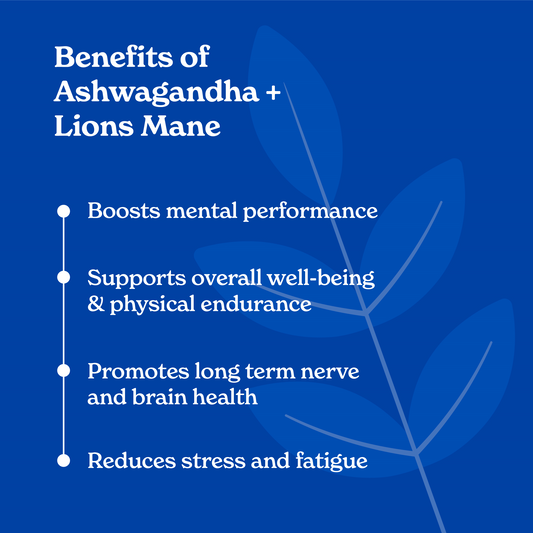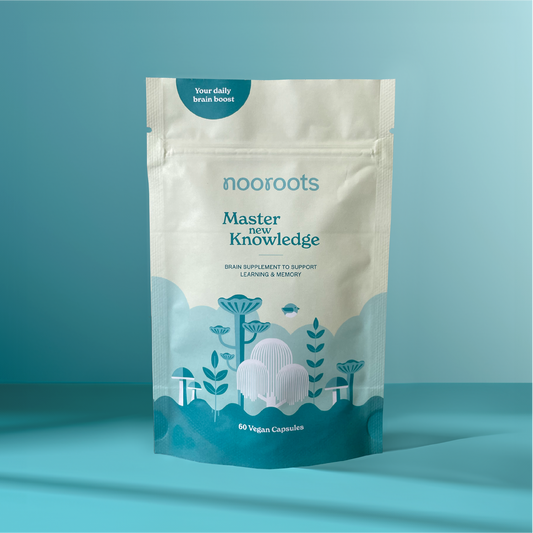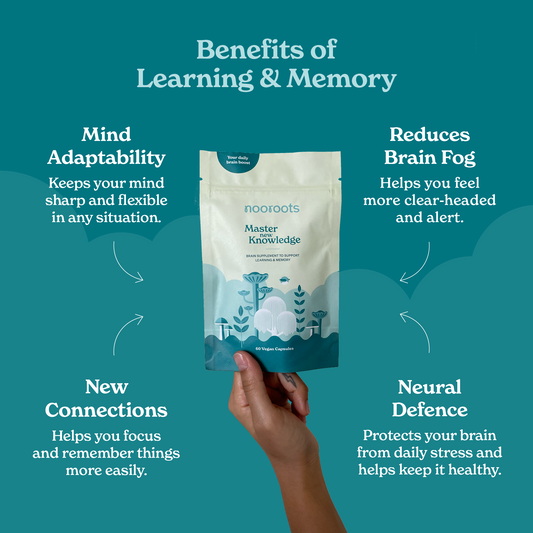Nootropics—often referred to as “smart drugs” or cognitive enhancers—have attracted widespread attention for their potential to improve mental performance, including learning, memory, and focus. Originally coined in the 1970s to describe substances that could enhance cognitive function without significant side effects or dependence, the term now encompasses a broad range of natural and synthetic compounds that support brain health and performance.
In recent years, interest in nootropics has surged among healthy adults seeking to optimize productivity, maintain mental clarity, and counteract cognitive fatigue. This growing trend reflects a broader societal shift toward performance-oriented lifestyles and the pursuit of sustainable ways to enhance mental resilience.
This blog explores the realm of natural nootropics, focusing on evidence-based ingredients shown to support learning and memory. We will examine the scientific foundations behind these compounds and discuss how they may be safely and effectively integrated into daily routines to naturally promote cognitive well-being.
Contents
- Understanding Learning, Memory, and Natural Nootropics
- Top Natural Nootropics for Learning and Memory
- How to Incorporate Natural Nootropics into Your Routine
The Best Natural Nootropics for Learning and Memory

Understanding Learning, Memory, and Natural Nootropics
Learning and memory are foundational cognitive processes that shape how humans perceive, adapt to, and interact with the world. Learning refers to the acquisition of new information or skills through experience or instruction, while memory involves the encoding, storage, and retrieval of that information. Together, they underpin intelligence, decision-making, and the capacity for personal and intellectual growth.
At the neurobiological level, both learning and memory rely on the brain’s capacity for neuroplasticity—its remarkable ability to reorganize and form new neural connections in response to experience. This process involves complex biochemical signaling between neurons, the strengthening of synaptic connections (known as long-term potentiation), and the generation of new neurons in specific brain regions such as the hippocampus (Kandel et al., 2014). Sustaining these functions depends on adequate cerebral blood flow, balanced neurotransmitter activity, and protection against oxidative and inflammatory stressors that can impair neural communication.
Natural nootropics are compounds derived from plants, herbs, and other natural sources that are believed to support these cognitive functions. Unlike synthetic cognitive enhancers, which may carry higher risks of side effects or dependency, natural nootropics typically aim to optimize brain health through mechanisms that align with the body’s own physiology.
Many natural nootropics have been studied for their potential to:
- Enhance cerebral blood flow, improving oxygen and nutrient delivery to brain tissue.
- Support neuronal integrity, protecting brain cells from oxidative stress and inflammation.
- Modulate neurotransmitters, such as acetylcholine and dopamine, which are critical for attention, memory, and learning.
- Promote neurogenesis and synaptic plasticity, fostering the brain’s capacity for adaptation and long-term cognitive resilience.
By supporting these underlying biological pathways, natural nootropics may contribute to improved mental clarity, sharper memory, and sustained focus—offering a holistic, evidence-aligned approach to cognitive enhancement and healthy brain aging.
Top Natural Nootropics for Learning and Memory
Below, we explore some of the most effective natural nootropics for boosting learning and memory.
Ginkgo Biloba:
- Background and Historical Use: Ginkgo biloba, one of the oldest living tree species, has been used in traditional Chinese medicine for thousands of years to enhance brain health.
- Mechanism of Action: Ginkgo works by increasing cerebral blood flow, thus improving oxygen and nutrient delivery to the brain.
- Benefits and Supporting Research: Studies suggest that Ginkgo biloba enhances cognitive function, particularly in the elderly, by improving memory and processing speed.
Bacopa Monnieri:
- History and Traditional Applications: Known as Brahmi in Ayurvedic medicine, Bacopa monnieri has been used for centuries in India to enhance brain function.
- How it Works: Bacopa enhances neurotransmission by increasing the proliferation of dendrites, thereby enhancing neural communication.
- Clinical Findings: Research indicates that Bacopa monnieri improves memory formation and retention, especially in aging populations, making it a staple in cognitive enhancement supplements.
Rhodiola Rosea:
- Cultural Significance and Traditional Use: Used for centuries in Russian and Scandinavian traditional medicine, Rhodiola rosea is revered for its adaptogenic properties.
- Action: Rhodiola improves the body's stress response mechanisms and cognitive function, making it especially beneficial during stressful situations.
- Research Evidence: Studies show that Rhodiola can enhance concentration and memory, particularly under conditions of stress and fatigue.
Lion’s Mane Mushroom:
- Traditional Uses and Active Compounds: This mushroom has been used in traditional Chinese medicine for its general health benefits and to enhance brain health.
- Benefits: Lion’s Mane is known for stimulating the production of nerve growth factor (NGF), which is essential for the growth and survival of neurons.
- Research Findings: Clinical studies suggest that Lion's Mane supports cognitive enhancement and may help prevent the cognitive decline associated with aging.
CDP-Choline (Citicoline):
- Overview of Health Benefits: CDP-Choline is crucial for brain health as it enhances the synthesis of phospholipids, integral components of brain cell membranes.
- Mechanism: Citicoline increases phospholipid synthesis in the brain, which enhances overall brain metabolism and neural communication.
- Evidence: Research supports that Citicoline improves memory and has potential benefits in conditions like dementia and other cognitive disorders.
Turmeric (Curcumin):
- Traditional Use and Bioactive Compounds: Turmeric has been used for thousands of years in Ayurvedic and Chinese medicine, primarily for its anti-inflammatory properties.
- Action: Curcumin, the active compound in turmeric, has potent anti-inflammatory and antioxidant effects that benefit brain health.
- Clinical Benefits: Studies indicate that curcumin improves symptoms of depression and helps maintain cognitive function in the elderly.
Blueberry:
- Nutritional Profile and Health Benefits: Blueberries are rich in flavonoids, which are known for their antioxidant properties.
- How it Works: The antioxidants in blueberries help reduce oxidative stress and inflammation in the brain, which can enhance cognitive functions.
- Research Insights: Consuming blueberries has been linked to improvements in memory, executive function, and mood.
B-Vitamins:
- Roles in Brain Health: B-Vitamins, particularly B6, B9, and B12, play critical roles in brain health and are essential for reducing levels of homocysteine, a risk factor for cognitive decline.
- Mechanisms: These vitamins are crucial for maintaining brain metabolism and the integrity of the nervous system.
- Benefits: Adequate levels of B-Vitamins are linked to improved cognitive functions and a reduction in the risk of age-related brain ailments.
L-Tyrosine:
- Importance in Neurotransmitter Synthesis: L-Tyrosine is a precursor to important neurotransmitters such as dopamine, norepinephrine, and epinephrine.
- Action: By boosting the production of these neurotransmitters, L-Tyrosine supports brain functions related to alertness, attention, and focus.
- Benefits and Studies: Supplementing with L-Tyrosine has been shown to enhance cognitive performance, especially in stressful situations.
How to Incorporate Natural Nootropics into Your Routine
Tips for Selecting High-Quality Supplements
When selecting natural nootropic supplements, choose reputable brands that provide full transparency about ingredient sourcing, dosages, and clinical evidence. Opt for standardized extracts and bioavailable nutrient forms, and verify that each product has undergone independent third-party testing for purity and potency. Look for certifications such as GMP, NSF, or ISO to ensure manufacturing quality, and avoid proprietary blends or unnecessary additives. Reputable brands should publish Certificates of Analysis (COAs) and comply with relevant regulatory standards to guarantee safety, efficacy, and integrity.
Recommended Dosages and Timing for Optimal Effects
Appropriate dosing varies between nootropics and should be adjusted according to personal tolerance and desired effects. For example:
- Ginkgo Biloba: 60–240 mg per day (standardized extract, 24% flavone glycosides, 6% terpene lactones), taken in the morning or early afternoon.
- Bacopa Monnieri: 300–600 mg per day (standardized to 50% bacosides), taken in the morning with food; benefits increase with consistent use over 8–12 weeks.
- Rhodiola Rosea: 100–400 mg per day (standardized to 3% rosavins and 1% salidroside), taken in the morning about 30 minutes before breakfast.
- Lion’s Mane Mushroom: 500–1,000 mg per day (standardized extract containing 20–30% beta-glucans), taken in the morning or midday.
- CDP-Choline (Citicoline): 250–500 mg per day, taken in the morning or early afternoon.
- Turmeric (Curcumin): 500–1,000 mg per day (standardized to 95% curcuminoids) with black pepper extract (piperine) for absorption, taken with meals in the morning or midday.
- Blueberry Extract: Equivalent to 100–300 g fresh berries or 500–1,000 mg extract per day, taken in the morning or with meals.
- B-Vitamins (B6, B9, B12): B6: 10–50 mg, B9 (Folate): 400–800 µg (as methylfolate), B12: 500–1,000 µg (as methylcobalamin), taken in the morning with food.
- L-Tyrosine: 300–500 mg per day (or N-Acetyl-L-Tyrosine: 100–300 mg), taken 30–60 minutes before mentally demanding tasks.
It is generally recommended to take these doses in the morning or early afternoon to support daytime focus and minimize potential disruption to nighttime rest.
Advising Consultation with a Healthcare Provider Before Starting Any New Supplement
Before beginning any new supplement regimen, consult a qualified healthcare professional to ensure safety and suitability. This is especially important if you have pre-existing health conditions, are pregnant or breastfeeding, or are taking prescription medications, as certain nootropics may interact with drugs or influence underlying health factors. A healthcare provider can help assess potential contraindications, recommend evidence-based dosages, and tailor supplement use to your individual physiology and cognitive goals.

Conclusion
Natural nootropics present a compelling, evidence-aligned approach to supporting learning, memory, and overall cognitive resilience. By leveraging bioactive compounds derived from plants, herbs, and natural sources, these substances work synergistically to promote brain health, enhance neuroplasticity, and protect against cognitive decline associated with aging and stress.
When integrated thoughtfully and paired with a balanced lifestyle—including adequate sleep, nutrition, and mental engagement—natural nootropics can contribute meaningfully to sustained cognitive performance. Adhering to scientifically supported dosages and selecting high-quality, standardized formulations ensures both safety and efficacy.
Harnessing the potential of natural nootropics represents not merely a pursuit of sharper focus or better memory, but a long-term investment in the brain’s adaptability and vitality. Through consistent, mindful use, these compounds may help unlock the brain’s natural capacity for growth, clarity, and cognitive excellence.







